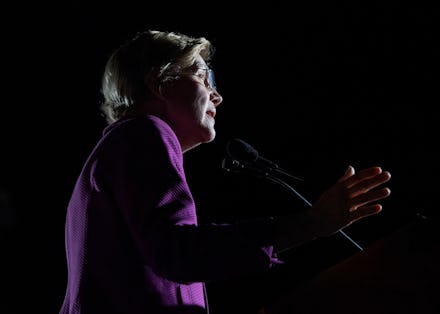Elizabeth Warren drops out, leaving two white men as the Democrats' main choices

On Thursday, progressive Massachusetts Sen. Elizabeth Warren suspended her campaign for the Democratic presidential nomination, marking a disappointing end to what was once a powerhouse run for the presidency. "I will not be running for president in 2020," Warren told reporters during a press conference outside her home announcing her decision. "But," she added, "I guarantee I will stay in the fight."
In remarks she shared with campaign staff on a call and later posted to Medium, Warren sounded an optimistic note, explaining that although her campaign was over, "what we have done — and the ideas we have launched into the world, the way we have fought this fight, the relationships we have built — will carry through, carry through for the rest of this election, and the one after that, and the one after that."
Warren announced her decision following an anemic showing during the Super Tuesday primary races earlier this week, where placed no higher than third in any state — including in her home state of Massachusetts, where she finished in third place behind former Vice President Joe Biden and Vermont Sen. Bernie Sanders.
In an emotional moment at the start of her press conference, Warren said one of the hardest parts of dropping out is disappointing young girls whom she'd promised she'd win. Warren famously offered pinky promises to girls she made on the campaign trail, urging them to remember that "running for president is what girls do."
"All those little girls are going to have to wait four more years," Warren said Thursday. "That's gonna be hard."
Warren's campaign, marred by an seeming inability to choose whether to occupy a more progressive lane or a more traditional one, had largely predicated itself of a message of financial regulation that attempted to bridge the gap between the Sanders populist revolution and the Biden vision of more mainstream, if lightly regulated, capitalism. As a result, her calls for "big, structural change" were largely eclipsed by her rivals' all-or-nothing stances. Similarly, her inability to connect with African American voters in a meaningful way, allegations of racial insensitivity within her campaign operation, and lingering fallout from her bungled claims of Native ancestry, left her struggling to expand her base.
Warren acknowledged some of the challenges of her candidacy, explaining to reporters that she understood the difficulties of breaking out of the "two-lane" paradigm. She thought it "wasn't right" that she was told the Democratic race only had room for two types of candidate, she said, "but apparently I was wrong."
Warren also addressed the difficulties of addressing sexism in the presidential race. "You know that is the trap question for every woman," Warren began when asked about the role gender played in the primary. "If you say, yeah, there was sexism in this race, people say 'Whiner!' But if you stand up and say there was no sexism in this race, about a bazillion women say, 'What planet are you living on?'"
By leaving the race, Warren has essentially left the Democratic Party with no middle ground for voters stuck between Sanders's self-proclaimed democratic socialism and Biden's embrace of more moderate policies. And while her platforms skewed more toward the party's left wing, her candidacy never generated the same sort of electric enthusiasm that has animated Sanders's campaign and allowed him to stake his claim as the progressive standard-bearer. Long lines of eager selfie-takers and vocal supporters notwithstanding, Warren was unable to translate her core message into enough votes to keep her campaign alive.
Despite lagging poll numbers during the final weeks of her campaign, Warren managed to fatally wound onetime candidate Mike Bloomberg during his first Democratic presidential debate, calling out his long history of alleged sexism and labeling him an "arrogant billionaire." Bloomberg ended his bid for the White House one day before Warren. While Sanders may have predicated his campaign on fighting "millionaires and billionaires," Warren's debate performance against Bloomberg most clearly offered voters a realtime example of what that can look like — and had some supporters salivating at the thought of her taking on President Trump in a debate this fall.
"I can think of one billionaire who has been denied the chance to buy this election," Warren quipped in her remarks to her staff.
By ceding the primary race to Sanders and Biden, Warren remains in a position to exert substantial influence on who will end up the Democratic nominee for president. Both the Biden and Sanders camps have reportedly begun courting her for an endorsement that would either bolster Sanders's campaign, or — should she back Biden — effectively end it. But speaking to the press on Thursday, Warren signaled that any endorsement might be some time coming, explaining that "I need some space around this, and I want to take a little time to think a little more."